I’m scared I’ll lose my sight when Edinburgh eye hospital closes

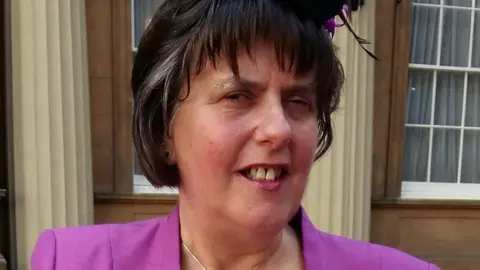 Sylvia Paton
Sylvia PatonA grandmother says she is scared of losing the last bit of her sight if an emergency happens during the six-month closure of Edinburgh’s eye hospital.
Sylvia Paton, 62, who has had complex eye conditions all her life, has been a regular patient at Princess Alexandra Eye Pavilion since it opened in 1969.
Sylvia has appointments at least four times a year and says its temporary closure from 28 October is making her fearful and anxious.
The building in Chalmers Street was deemed not fit for purpose in 2015. It is closing while contractors replace two waste pipes and remove asbestos.
All patients will have their appointments moved to other NHS Lothian facilities.
Sylvia told BBC Scotland that the hospital had saved what remains of her sight on on multiple occasions.
She has Aniridia – a rare condition where the iris does not form properly.
Last year she had an emergency that required an operation involving several departments. These are all currently under one roof at the Chalmers Street site.
The former civil servant says she fears that dispersal of these departments across NHS Lothian will cause delays and complications for patients.
“My surgeon needed to have images of my eye to see what was going on before he could operate,” she says.
“He saved my vision because of the quick treatment and timescale.
“If it had taken longer because it was all dispersed he wouldn’t have been able to do that.”
Sylvia also says that for visually-impaired people the familiarity of the route to the eye hospital is vital.
Taxis to different sites across Lothian would be unaffordable for many, she added.
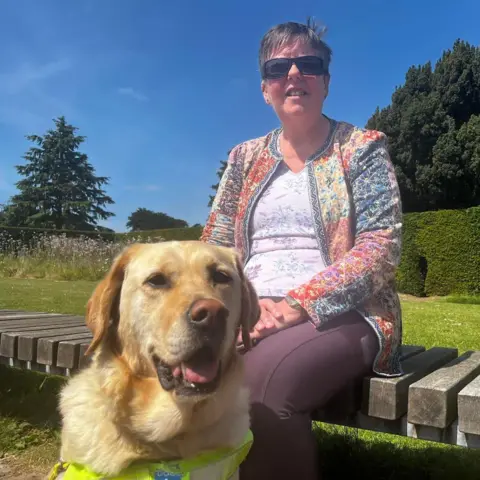 Sylvia Paton
Sylvia PatonPrincess Alexandra Eye Pavilion currently has about 1,500 patients a week.
A £45m replacement eye hospital sited on the Royal Infirmary campus at Little France was agreed in 2018, but funding was later withdrawn by the Scottish government.
However, in 2021 then Health Secretary Humza Yousaf said a new eye hospital would be part of a £10bn investment in the NHS estate over 10 years.
The cost to replace the Eye Pavilion has since been put at £123m.
In February, NHS construction projects across the country were put on hold for up to two years as a result of budget pressures.
Plans to reveal which new treatment centres will be built have been delayed until the 2025/26 Scottish budget in December.
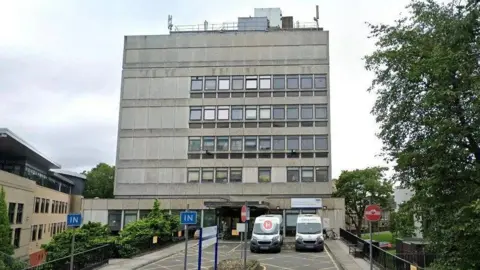 Google
GoogleLorna Pratt, 73, who is a frequent visitor to the eye hospital, says the six month closure for repairs is “incredibly concerning”.
She has keratoconus – a condition where the cornea thins and bulges, causing distorted and blurred vision.
Lorna has been a patient at the eye pavillion for 50 years.
“Many vulnerable, frail and elderly people will now be forced to travel elsewhere, perhaps to multiple different locations, for vital eye care,” she says.
“Finding your way to somewhere new and then negotiating a location that is not designed for those with sight loss is challenging, to say the least.”
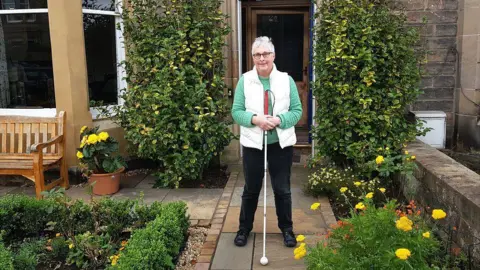 Lorna Pratt
Lorna PrattLorna says that after her experience in the eye pavilion last year, she knows Edinburgh urgently needs a new hospital.
She says: “Last summer, when my vision was particularly poor as I recovered from surgery, everything in the ward was white – the walls, the bed linens, the toilets, the light switches.
“It felt like I was trapped in a blizzard. My daughter had to bring in neon tape so I could find my way around.”
But she says the contingency plans are being rushed into place.
“I’m worried, too, about what will happen if something goes wrong with my eyes during this time, will I be shunted from pillar to post?
“Fearing that we’ll be without joined-up care for six months is very alarming, and it’s even worse knowing we’re still waiting for a new hospital.”
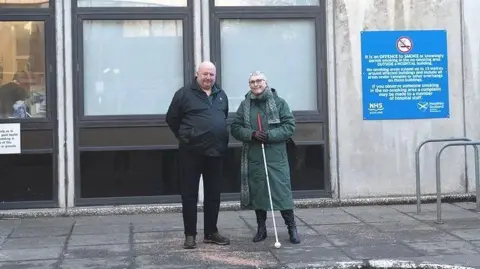 Iain Young
Iain YoungIain Young, an RAF veteran from East Lothian, has been undergoing diagnosis for suspected Stargardt disease – a condition that causes vision loss.
“Losing your sight is incredibly traumatic, and now vulnerable people are being forced to go elsewhere for treatment,” he says.
The 60-year-old says it is “disgraceful” that the hospital is being closed for repairs without a suitable alternative in place.
“Every time I visit, there’s some issue, whether it’s flooding, leaks, or the lack of parking.
“For people like me coming from East Lothian, what should be a 40-minute trip turns into an hours-long ordeal.
“It’s appalling, and now it is going to get worse.”
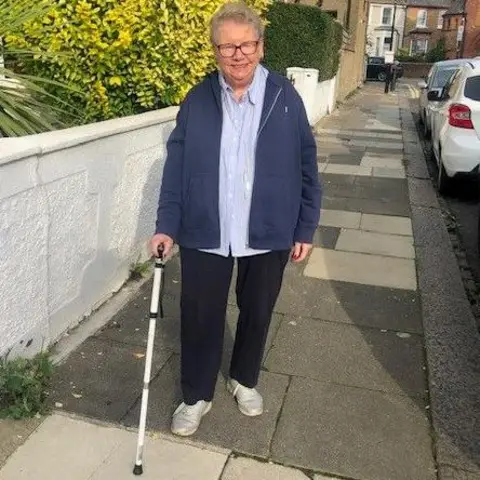 Hazel Kelly
Hazel KellyHazel Kelly, 80, who became visually impaired 13 years ago, says she had two operations cancelled at the hospital due to a leaking roof.
“They think the services can be all over the place but you could go to one clinic and then find out you need to got to another one,” she says.
“The time it takes you to go to them all you could lose the sight you have.
“I’m terrified and angry about this.”
Complex relocation
Charity Sight Scotland said it was extremely concerned that the “health and wellbeing of eye patients overlooked once again”.
Chief executive Craig Spalding said: “The temporary closure of the eye hospital raises serious questions about patient care, continuity of services, and access to essential treatments.
“This building has been deemed unfit for purpose for over a decade, yet NHS Lothian is set to pour millions into patching up a leaky roof, while the entire facility remains a disaster zone.”
NHS Lothian says the relocation of services from the Eye Pavilion is “extremely complex” and requires alternative spaces that provide the right clinical environment.
Michelle Carr, NHS Lothian’s chief officer acute services, says: “Every effort is being made by our teams to minimise and mitigate disruption to patients and to co-locate sub-specialties together where possible.
“Our priority is to ensure the continuity of safe and effective care for our patients and we will provide them with confirmed details of locations of each clinic as soon as possible.”










